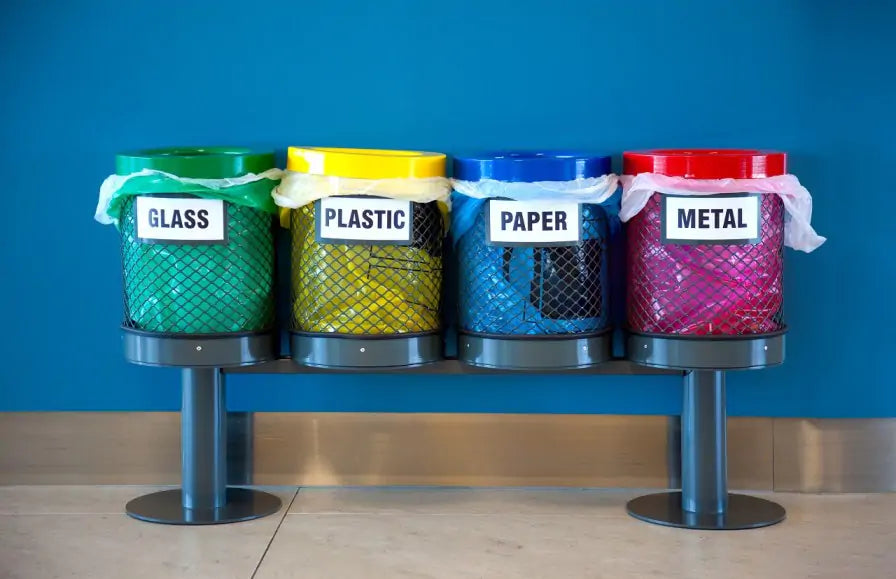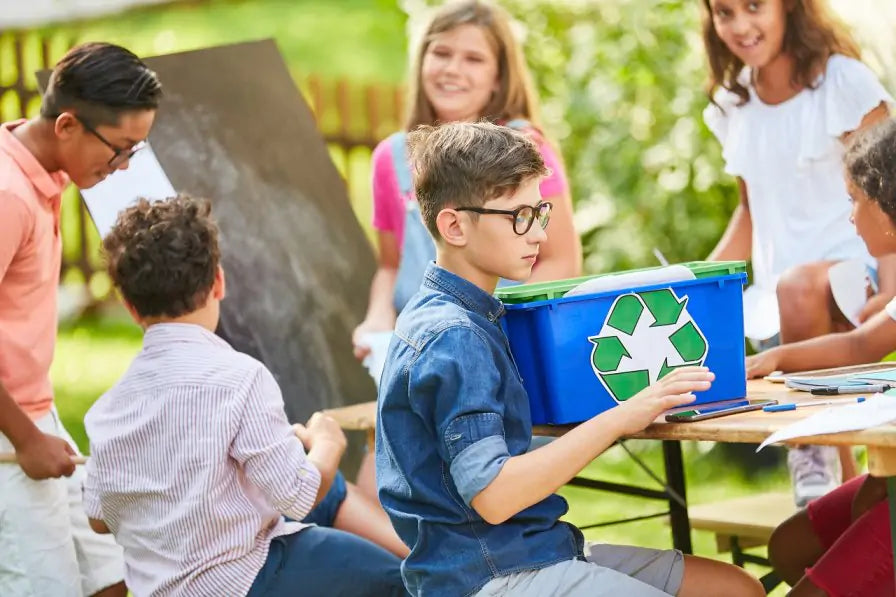Your basket is currently empty.
Shop NowRecycling Guide for Primary School Children

Recycling Guide for Primary School Children
Reduce, Reuse, Recycle
It’s easy to think that we have as much paper, plastic and metal on the planet as we’ll ever need, but that’s not true. We need to be very careful not to waste anything, and that also includes water, electricity, clothes, furniture and anything else you can think of.
The best way to do this is to use less where we can – this is when we reduce.
Then we see if we or someone else can use things a second time – this is when we reuse.
If something can’t be used again, like an empty tin, we send it away to be turned into something new – this is called recycling.
How does recycling work?
Recycling works in different ways, depending on the material.
Paper is mixed with water and the ink is removed. The wet pulp is then dried and squeezed very tightly to make new sheets of paper.
Aluminium cans are melted down and cleaned. The aluminium is then shaped into new cans or turned into other items.
Tin cans are soaked in special chemicals to separate the tin coating from the steel. The tin is melted down and the steel is crushed. The tin and steel are then used to make new cans and other metal objects.
Plastic is washed and cut into small pieces. Any glue is removed and the clean plastic is melted and made into small pellets. Depending on the type of plastic, these pellets can then be used for anything from new bottles to toys.
Glass is broken into tiny pieces, mixed with special materials and melted. The hot, liquid glass is then made into new shapes and used again.

Be green!
When we recycle and look after our planet, we call it being green. It’s also called being environmentally friendly. This is because we’re helping to keep the environment alive with plenty of green grass, plants and trees.
Find your bin
Do you have a recycling bin at home? Ask your mum and dad if you’re not sure. You don’t want to accidentally put things that can be recycled into the wrong bin.
What can I recycle?
There are lots of things that can be recycled when you’re finished with them. Old magazines and comics, empty cans and plastic bottles, even old bus tickets! Food and garden waste such as grass can also be recycled, but this needs to go in a special bin or taken to a recycling centre.
Can everything be recycled?
Most things can be recycled but there are some types of plastic, glass and packaging that can’t be put into a recycling bin. Check the packaging for recycling information, and ask a parent of teacher if you need help.
Clean and crush
You can keep your recycling bin from smelling bad and help the recycling people by cleaning tins and bottles first. Crushing plastic bottles and aluminium cans also helps because they then use less room. Be careful with sharp edges and ask an adult for help if you’re not sure.
Recycle at school
You throw away a lot of paper at school and you may have empty bottles and food packaging left over from lunchtime too. If you have something you don’t need anymore, ask a teacher if there’s a recycling bin nearby and you’ll have the greenest school around.
It’s not just paper, plastic and cans
All kinds of electronic items can be recycled, like old mobile phones and cameras, games consoles and computers, and even single batteries. Ask your parents or teacher about nearby recycling centres, and make sure your parents take broken and unwanted appliances to them as well, whether it’s a TV or a toaster. Also see if your supermarket has a special bin for used batteries so that they can be melted down and made into new ones.
Can you reuse it?
If you’ve written a note and you’re about to throw it away, save the paper and use the other side another time. Yoghurt pots are great for growing small plants, so save some for when you want to do some gardening. You could even be really creative and use old paper and plastic bottles to create colourful art projects. Then, when you don’t want them anymore, they can still be recycled.
Can it be shared?
If you have books, toys, games or clothes that you don’t want, see if a friend would like them before throwing them away. If they don’t, ask your parents to take you to a charity shop so that someone else can enjoy them.
If you have old magazines and comics, you could take them to a dental clinic, hospital or health centre for visitors to read. And always look out for charity bags through your letterbox, as it’s a great way to get rid of old clothes whilst helping people in need.
You can even reuse food!
Many families save leftovers from meals and use them the next day. If you have some tasty meats and vegetables left after a salad, why not use them in a sandwich or as a delicious pizza topping tomorrow? Just always make sure that leftovers are stored in the fridge and covered up properly. For food that needs throwing away, ask your parents and teachers about composting – a great way to reuse food and help gardens and allotments grow!

It’s so easy!
Recycling is so much easier than it was when your parents and teachers were kids. Almost everything can now be recycled and most homes have their own recycling bins. The important thing is that you remember to recycle, so don’t throw something into a normal bin if it can go in a recycling bin.
By working together, our planet will always have enough materials and you’ll be doing your bit to help the environment.
Have fun being a recycling superhero!
If you need more information on how you can kickstart your recycling efforts at home, why not have a look at our Top 10 easy ways to start recycling at home.
